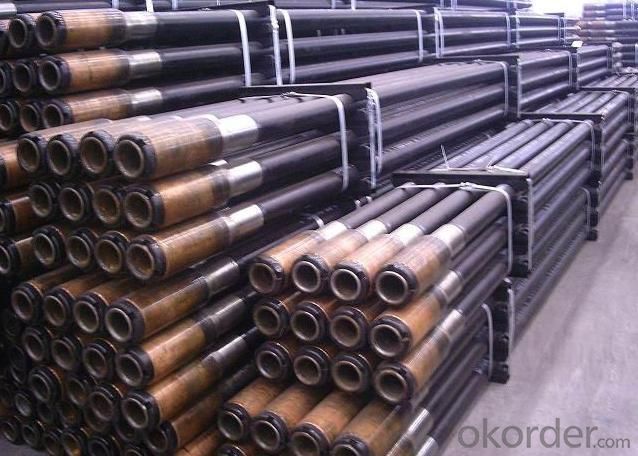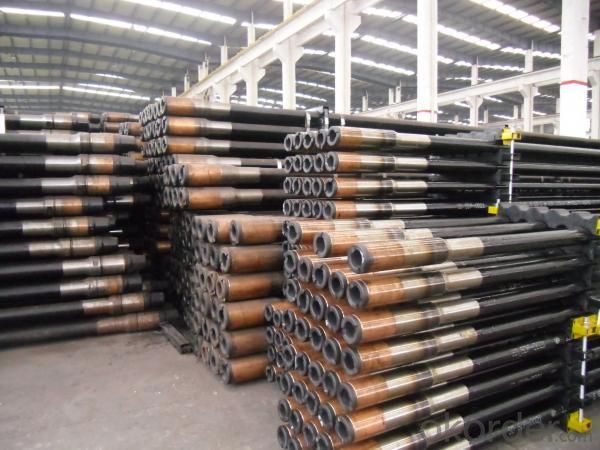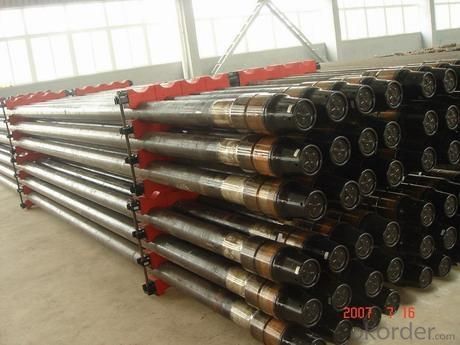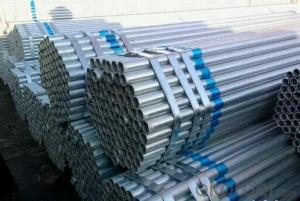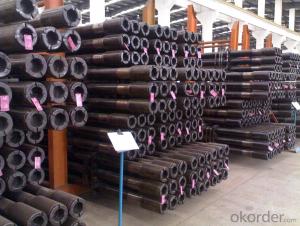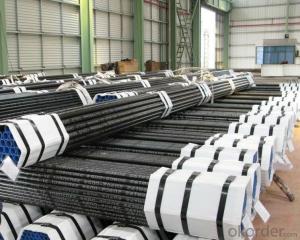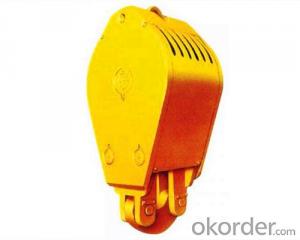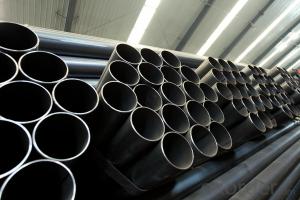API 5DP oilfield use drill pipe
- Loading Port:
- Shanghai Port
- Payment Terms:
- TT or LC
- Min Order Qty:
- 1t m.t.
- Supply Capability:
- 5000 Tons Per Month m.t./month
OKorder Service Pledge
OKorder Financial Service
You Might Also Like
Main feature:
A. The drill rods comply with the provisions of API SPEC 5D & API SPEC7.
B. The grade of steel are determined according to the requirements of Group 1 & Group 3 of API SPEC 5D.
C. Drill pipe joints at the same level comply with the provisions under the Standard API SPEC 7.
Drill Pipe Feature:
A. High precision in size and shape
B. Good low temperature toughness
C. Excellent comprehensive mechanical properties
D. High connection strength and sealability
E. Large inside diameter of tool joint
F. High torque resistance
G. High fatigue strength and long fatigue life
Internal Coating Feature:
A.High abrasion resistance and low friction factor
B. Good adhesion and flexility
C. High application temperature and pressure
D. High hardness and impact resistance
E. Good corrosion resistance
Hardbanding Feature:
A. Good balance between antiwear and friction-reduction
B. The wear rate is less than 6% of that of bare tool joint, which can prolong 3 times of the
tool joint service life
C. Good property of friction-reduction, which can reduce the casing wear to the least, and its
wear to casing is less than 11% of that of bare tool joint
D. Reduce the torque of drilling string
E. Good weldablity with little splash and good rewelding preformance
F. Friendly to environment
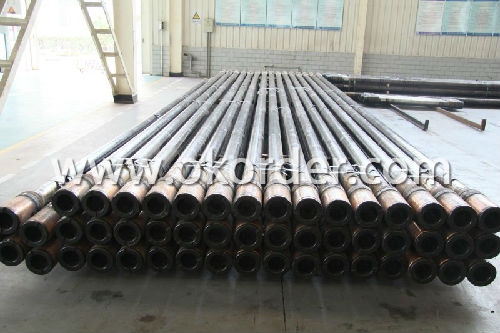
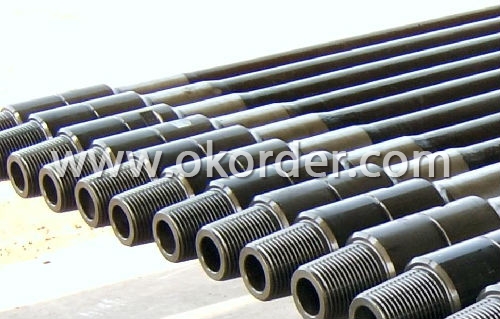
- Q: What is the theoretical weight per square meter of the steel pipe diameter of the outer frame and the thickness of the tube wall 3mm 48mm?
- Dimensions of ordinary steel tubes (taken from GB/T 17395-1998)The theory of weight / (kg/m) | wall thickness (2.9 3.0mm: 3.33)
- Q: Can steel pipes be used for underground stormwater drainage?
- Indeed, underground stormwater drainage can utilize steel pipes. These pipes possess durability and boast a high strength-to-weight ratio, rendering them appropriate for subterranean usage. They can endure substantial burdens and fend off corrosion, thus guaranteeing sustained effectiveness within stormwater drainage systems. Furthermore, steel pipes lend themselves to easy welding, facilitating customization and flexibility during both design and installation. Nonetheless, it is imperative to implement adequate corrosion protection measures, such as the application of a protective coating or the utilization of corrosion-resistant alloys, to avert degradation over time. Regular maintenance and monitoring are also advisable to uphold the pipes' integrity and ensure optimal stormwater drainage functionality.
- Q: How are steel pipes used in the telecommunications network infrastructure?
- Steel pipes have a wide range of applications within the telecommunications network infrastructure. Underground cable conduits are one of the main uses of steel pipes in this industry. These conduits are responsible for safeguarding telecommunications cables from various external factors, including moisture, rodents, and physical damage. By providing exceptional strength and durability, steel pipes ensure the long-term protection of these cables. Furthermore, steel pipes are indispensable in the construction of telecom towers and antenna masts. These structures must possess robustness and resilience to withstand adverse weather conditions. Steel pipes offer the necessary strength, stability, and durability required for telecom towers to support antennas and other equipment. Additionally, their ease of assembly enables efficient deployment and maintenance of the network infrastructure. Additionally, steel pipes are crucial in the installation of fiber optic cables. Fiber optic cables transmit data at high speeds through the use of light signals. To ensure optimal performance, it is imperative to protect these cables from any external interference. Steel pipes serve as conduits for fiber optic cables, effectively shielding them from electromagnetic interference and other potential disruptions. To summarize, steel pipes play a vital role in the telecommunications network infrastructure. They are utilized for the installation of underground cable conduits, construction of telecom towers, and protection of fiber optic cables. The strength, durability, and versatility of steel pipes make them an ideal choice for guaranteeing the reliability and functionality of telecommunications systems.
- Q: Does the seamless steel pipe need rust removal?
- The main use of steel wire brush and other tools to polish the surface of the steel, you can remove loose or tilted skin, rust, welding slag and so on. Manual tool derusting can reach Sa2 level, power tools derusting can reach Sa3 level, if the surface of the steel attached to the solid oxide sheet, tool rust removal effect is not ideal, can not reach the corrosion protection requirements of the anchor depth.
- Q: What is the maximum allowable deflection for steel pipes?
- The maximum allowable deflection for steel pipes is typically determined by industry standards and design codes. These standards and codes specify the acceptable limits of deflection to ensure the structural integrity and functionality of the pipes. The maximum allowable deflection varies depending on various factors such as the pipe diameter, wall thickness, material properties, and the type of application. It is important to consult the relevant standards and codes, such as the American Society of Mechanical Engineers (ASME) B31.3 code for process piping or the American Water Works Association (AWWA) standards for water transmission and distribution pipes, to determine the specific maximum allowable deflection for a particular steel pipe application. Following these guidelines helps to ensure the safe and efficient operation of steel pipes in various industries and applications.
- Q: Can steel pipes be used for scaffolding?
- Yes, steel pipes can be used for scaffolding. Steel pipes are commonly used in scaffolding systems due to their strength, durability, and ability to support heavy loads. They provide a stable and secure platform for workers to perform construction and maintenance tasks at various heights.
- Q: How to establish a concrete-filled steel tubular column model in ANSYS?
- A two unit model or a composite unit model can be adoptedTwo units are constructed of steel tubes and concreteA composite unit may be either a fiber element or a section conversion attribute
- Q: Can steel pipes be used for underground sewage systems?
- Yes, steel pipes can be used for underground sewage systems. Steel pipes have high strength and durability, making them suitable for carrying sewage and withstanding the pressure and environmental conditions underground. Additionally, steel pipes have excellent corrosion resistance properties, which is crucial for sewage systems that are exposed to moisture and various chemicals.
- Q: Can steel pipes be used for underground air supply systems?
- Yes, steel pipes can be used for underground air supply systems. Steel pipes are often used in underground applications due to their strength, durability, and resistance to external factors such as corrosion and impact. They can withstand the pressure and temperature requirements of air supply systems and can be easily installed underground. Additionally, steel pipes have a long lifespan, making them a cost-effective choice for underground air supply systems. However, it is important to consider factors such as soil conditions, potential for corrosion, and local regulations when selecting the appropriate steel pipes for the specific underground air supply system.
- Q: How are steel pipes protected against microbial corrosion?
- Various methods are employed to safeguard steel pipes against microbial corrosion. One widely used technique entails applying coatings onto the surface of the pipes. These coatings act as a shield, effectively blocking the entry of microbes and their corrosive byproducts into the steel, thereby safeguarding it from degradation. Coatings like epoxy, polyethylene, and fusion bonded epoxy are frequently utilized to bestow this protection. Another method involves the use of corrosion inhibitors. These inhibitors are added to the fluid that flows through the pipes in order to impede microbial growth and prevent corrosion. They can be either organic or inorganic compounds that function by either eradicating the microbes or inhibiting their metabolic activity. Furthermore, ensuring proper maintenance and cleaning of the pipes is vital in preventing microbial corrosion. Regular inspections and cleaning routines aid in the elimination of any biofilms or microbial deposits that may have formed on the pipe's surface. This significantly reduces the likelihood of microbial corrosion and prolongs the lifespan of the pipes. In certain cases, cathodic protection may also be employed. This method entails utilizing sacrificial anodes or impressed current systems to supply a protective electrical current to the pipe. This current helps prevent the formation of corrosive microorganisms and shields the steel from corrosion. In summary, a combination of coatings, corrosion inhibitors, regular maintenance, and cathodic protection techniques are employed to protect steel pipes from microbial corrosion. By utilizing these strategies, the longevity and integrity of the pipes are ensured, benefiting various industries such as oil and gas, water supply, and sewage systems.
1. Manufacturer Overview
| Location | Wuxi, China |
| Year Established | 1991 |
| Annual Output Value | 300,000Tons |
| Main Markets | Europe; Southeast Asia; etc. |
| Company Certifications | API 5L;API 5CT;API Q1;ISO/TS29001 |
2. Manufacturer Certificates
| a) Certification Name | |
| Range | |
| Reference | |
| Validity Period |
3. Manufacturer Capability
| a) Trade Capacity | |
| Nearest Port | Wuxi; Shanghai |
| Export Percentage | 41% - 50% |
| No.of Employees in Trade Department | 3900-4000 People |
| Language Spoken: | English; Chinese; Spanish |
| b) Factory Information | |
| Factory Size: | Above 450,000 square meters |
| No. of Production Lines | Above 10 |
| Contract Manufacturing | OEM Service Offered;Design Service Offered |
| Product Price Range | Average |
Send your message to us
API 5DP oilfield use drill pipe
- Loading Port:
- Shanghai Port
- Payment Terms:
- TT or LC
- Min Order Qty:
- 1t m.t.
- Supply Capability:
- 5000 Tons Per Month m.t./month
OKorder Service Pledge
OKorder Financial Service
Similar products
Hot products
Hot Searches
Related keywords



